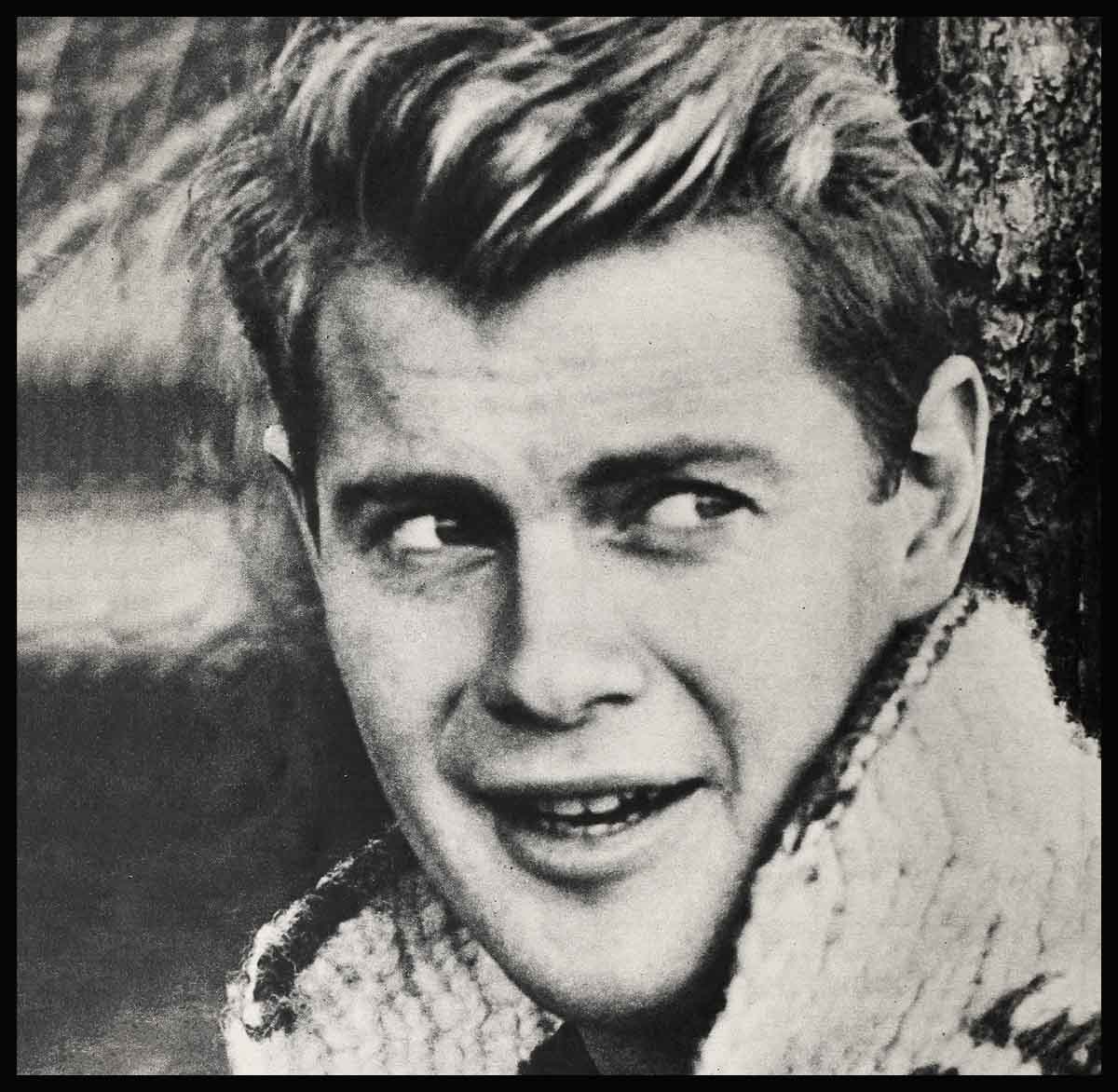
Hot weather Guy—Troy Donahue
Troy Donahue’s favorite season is summer, a real hot one, because, he says, “you always think something exciting is going to happen. And a lot of times it actually does. You sort of get to expecting things . . .”
Well, a good many exciting things have happened to Troy recently, summer or no, and he is the lad to appreciate and enjoy them.
Blond and blue-eyed, Troy looks younger than he really is, although he is still pretty young—23. But don’t let that mild expression fool you, or his soft voice, either. Take note of that stubborn chin.
“I am stubborn, you know,” he says, frankly. “I want my own way and I am likely to fight until I get it. I usually get it.”
In a short year he has reached some sort of pinnacle of Hollywood success. Producers are vying for him, pretty girls are ogling him, prominent hostesses are pursuing him for their parties. All this is heady stuff, coming so swiftly, and Troy is the first to admit it.
He says, quite simply, “I love it.” As who wouldn’t?
Troy was born January 27, 1937, in New York City. Not a hot summer day, at all, but a cold
blustery one. His father was Merle Johnson, of the motion picture division of General Motors Corp. His mother, Edith Johnson, a stage actress, had retired after her marriage. Troy’s father died when Troy was 14, leaving a void in his life and many scars on his soul. Then bad luck began to dog him.
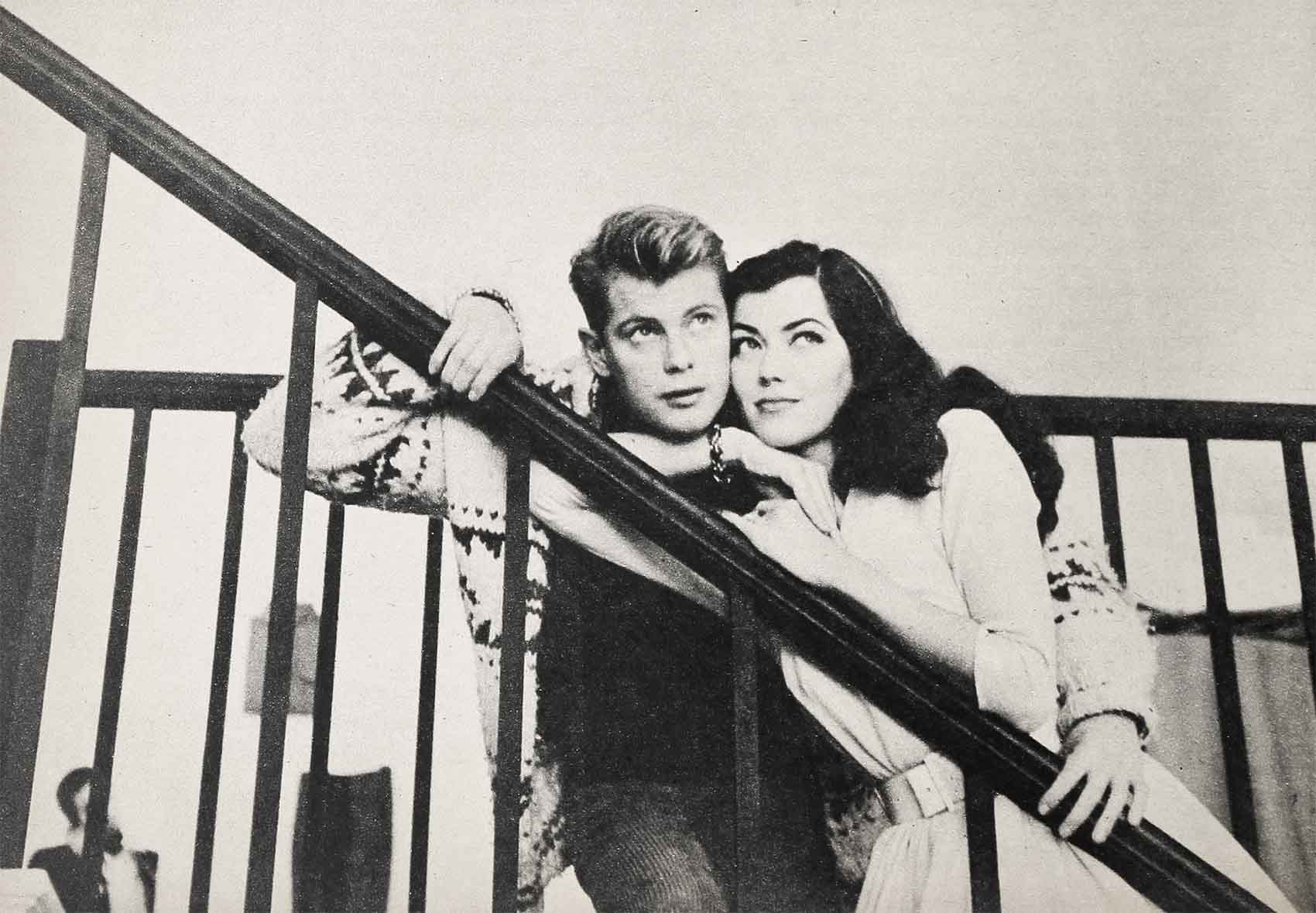
He attended Bayport High School on Long Island for two years and then the New York Military Academy, hoping for an appointment to West Point. But a severe knee injury suffered during a track meet disqualified him for that. However, he went on later to win letters in football, track and basketball. The stubbornness was already beginning to show. Then Columbia University, some classes in journalism, and studying acting with Ezra Stone. After that. a variety of jobs, the usual things, messenger, waiter, counselor at a camp and as a singer with a Long Island dance band.
But the bad luck hadn’t left him, or maybe the weather was too cool. He came to Hollywood at the behest of Darrell Brady, an old friend of his father’s and he was almost “discovered”, a la Lana Turner, when Producer William Asher and Director James Sheldon saw him in a diner and invited him for a test. What a break! But . . . that evening he was in an automobile accident and when the time came for his test, his head was shaved to a most humiliating baldness. He couldn’t do it.
But while he was convalescing a hot. day came along and so did an actress friend, Fran Bennett, who introduced him to her agent, Henry Willson. That . . . and the hot weather, we guess . . . did it.
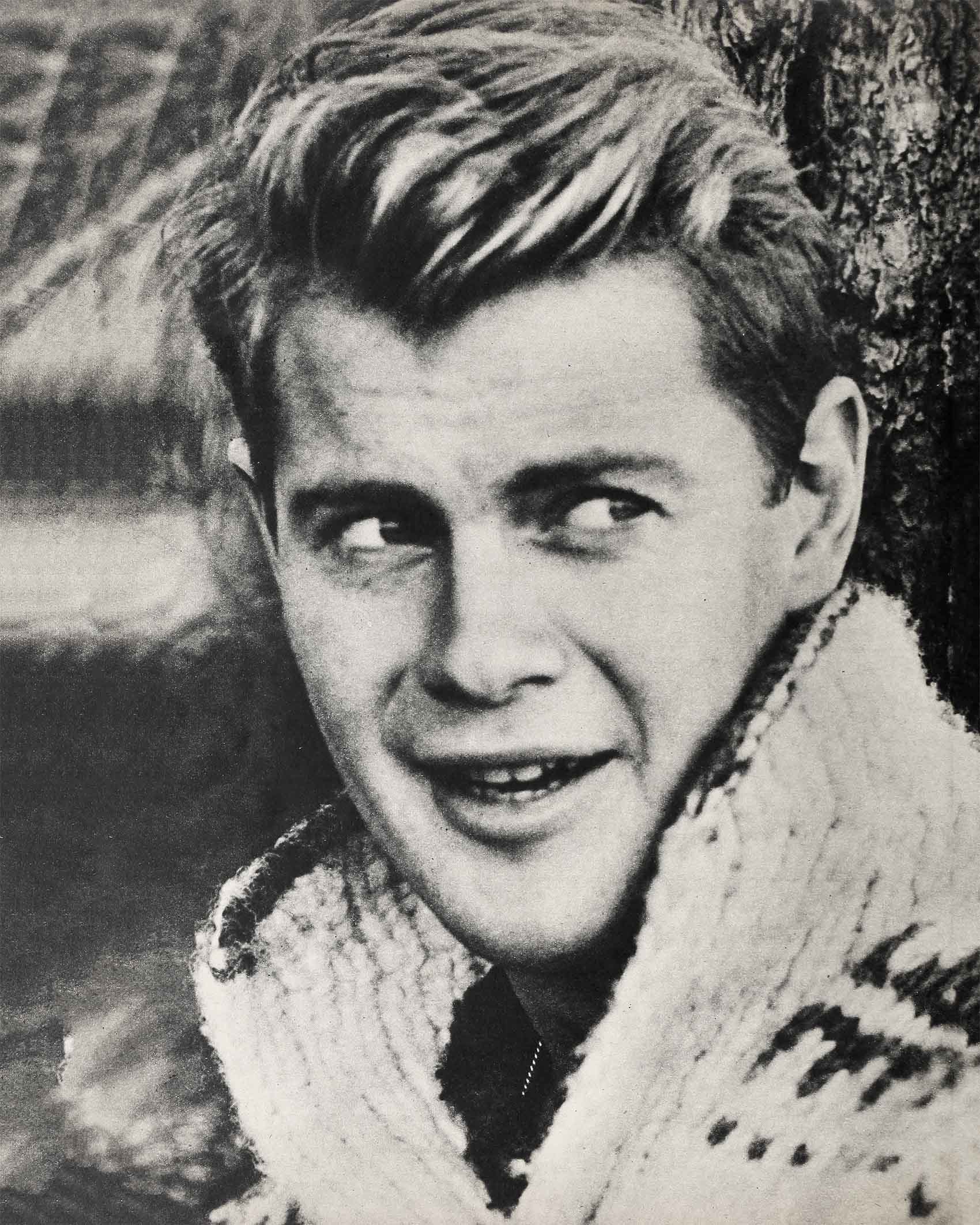
Anyhow, his name was changed forthwith from Merle Johnson, Jr. to Troy Donahue and the next thing he knew he was co-starring with pretty Sandra Dee as the young romantic lead in “A Summer Place”, followed immediately by “The Crowded Sky” with Dana Andrews, Rhonda Fleming and Efrem Zimbalist, Jr.
He wasn’t exactly surprised, you know. He had always been fairly sure of himself . . . that chin and all. But he was a touch surprised that it had all happened so swiftly. “After all,” he says, “we had had some fairly cool days!”
Now he has settled down, if you can call it that, into a little house in the hills above Hollywood.
“I’ll get out of this as soon as I can. After all, it was the cheapest thing I could find which would suit my needs at all. It isn’t what I want.”
What he has, whether he wants it or not, is a gay, comfortable little place with one bedroom, bath and a living room with a view of sorts. It has French Provincial furniture (his mother helped select it). He has given it color with rich tones of maroon, red and white and overtones of deep blue.
“It’s cheerful enough,” he frets. “But I want a bigger place, with a big fireplace and great vistas of views.”
Still, it has its compensations. His mother and teenaged sister, Eve, live near him and that is comforting.
“I have a little cubby-hole, a sort of closet, which I use for mail and writing. I shall always have a small room for writing. Somehow I seem closer to my thoughts.”
Troy takes his writing very seriously and has ambitions in this direction.
“I am a fanatic fan of sunlight,” he says, “and want to be out in it a lot. I guess that is because my father was in a hospital so long and it always seemed gloomy in there to me. But I want the inside of my house to be cool and shady . . . for contrast and rest, I guess.
“I like to plant things, too, but only corn and roses. The corn gives me a wholesome feeling, that I am growing food. And the roses . . . well, you know how roses are, especially in California. They are just as important as food and they’re pretty exciting.”
So . . . this isn’t what he “wants”. What he does want is a spacious dwelling with the aforementioned fireplace and views, with room to “spread out” and entertain lavishly and generously, indoors and outdoors. And room for more planting.
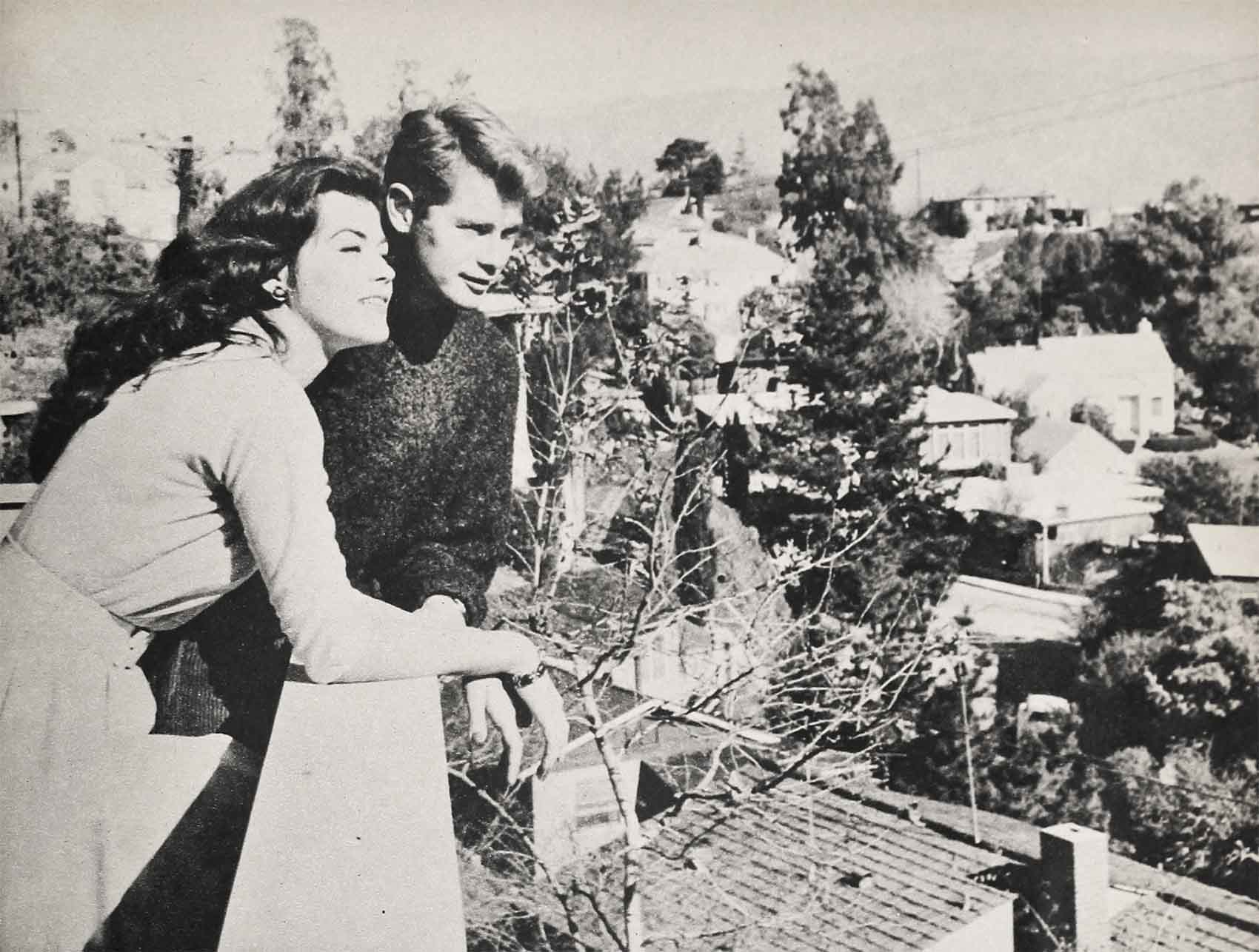
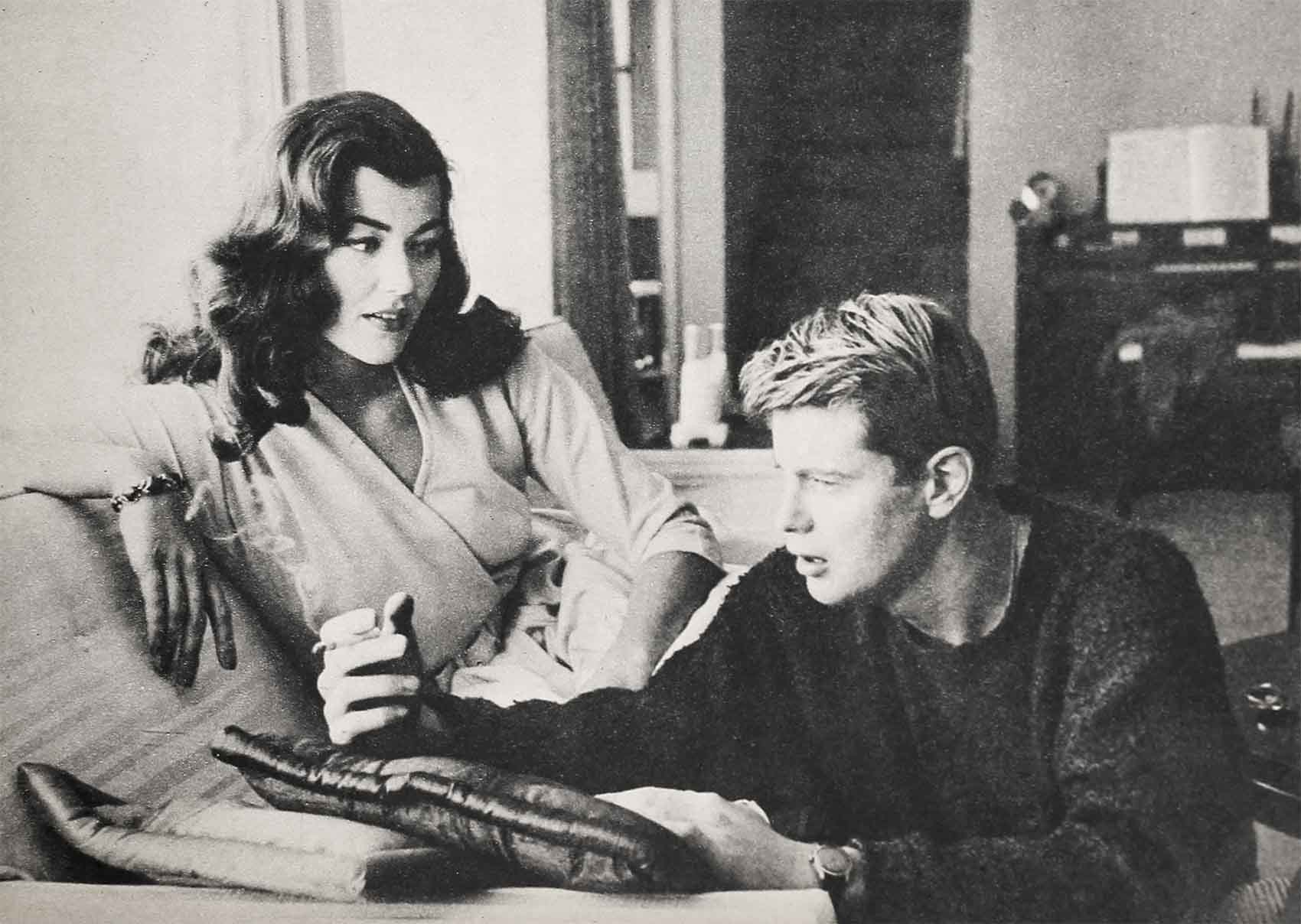
HOWEVER, he doesn’t do badly in the place that he “can afford.” He gives parties. Lots of parties. Not the big, lavish, formal affairs that he plans for later on. But nice, nevertheless. Six or eight people come and Troy cooks for them . . . steaks, spaghetti, chops. Sometimes, if he is feeling ambitious, he does shish-kabobs and then everyone applauds like crazy.
He is a deft man with a salad, too, the tossed green kind with a raw egg and some ripe blue cheese and shreds of ham or chicken. Desserts he either buys ready-made or leaves to the girls: “They can do those whipped cream and gelatin things,” he says firmly, “if they simply must have them.” You gather that such fluff means less than nothing to Troy.
Afterward, they play games or listen to music or perhaps read plays, each taking a role. Those are Troy’s favorite times.
The girls who clean up afterward? (You’d be surprised how enthusiastically they do it!) Sandra Dee is one and Mione Sabrilla is another . . . and Nan Morriss and two or three others who have nothing to do with pictures but whom Troy just happens to like and enjoy.
He takes these same girls on dates now and then but he is, as he puts it, “a touch moody about where and when I want to go.” Sometimes he feels like the movies, sometimes a big, expensive place, then again the beach for clam chowder or an Italian restaurant “where I often meet friends of mine.” He likes to experiment with out-of-the-way foreign restaurants.
These changes of moods keep the girls on their toes about clothes because Troy likes them to dress “appropriately”. “If we’re going to be formal,” he says, “let’s go all the way!
“I get tired of girls in jeans and slacks and T-shirts and sweaters. It’s nice to see a girl in a dress now and then. Those swirly bright-colored cotton things for daytimes, or the really simple things for dinner . . . you know, black or blue with sleek lines. Or a real gone dress for a big party, but I don’t like ‘bouffants’.
“Sandra Dee,” he went on, his face really lighting, “has been getting some wonderful clothes recently. I think she has been studying about them and she surely makes a man proud to take her out.
“But no pink,” he says firmly. “I don’t like pink or baby blue or any of those childish colors. I like white or black or red or even orange, so long as it is a positive, grown-up color.
“I don’t,” he added hastily, “want to set myself up as a fashion expert. I’m just saying what I like my girls to wear.”
But he is a bit fussy about women’s shoes. “It’s awful,” he avers, “if a girl turns up to go on a boat wearing teetery high heels. That can be downright dangerous. They sometimes wear the wrong shoes for golf, too, and even for dancing.
“But if she is neat and well-groomed and looks scrubbed . . . well, I can forgive her a lot of other things.
“I do,” he added, thoughtfully, “like girls with long hair. I don’t know why. It seems feminine, somehow.”
He is fond of buying clothes for himself and admits that he is extravagant about them. He thinks he is most comfortable in casual things but he wants them to be good casuals, expensive maybe. And he likes lots of them.
Tweedy things in browns, rusts, reds and blues. He likes white, too. If he buys only a pair of corduroys to wear in his small garden, he wants them well-cut and hand-tailored. He always keeps several suits on hand, beautifully pressed and cared for.
Custom-made shirts and pajamas and hand-made shoes are important to him, too, add to his contentment.
But of course beach togs and sun bathing outfits are most important of all in his wardrobe . . . just to encourage that hot weather. This is no gag with Troy. It is almost a superstition, a real belief, that the good things come to him when it is hot and sunny. Naturally, he likes girls who enjoy the sunshine, too.
But don’t think that Troy is so concerned with weather and material possessions that he isn’t concerned about his career and his life and his future. There is probably not a more dedicated young actor in Hollywood and he means it. It is simply that Troy is a perfectionist in everything that touches his life, his work and how he lives, how he dresses and how his house is furnished.
He will be a perfectionist about marriage, too, when the time is ripe.
“I don’t see why marriage should present any problems,” he reflects. “I have a job like any other man and I expect to work at it from now on. I can see that two careers in one family might cause complications but they don’t seem too serious to me. I know of some beautiful marriages here in Hollywood.
“My own father and mother, for that matter, had a beautiful marriage. I’d like to remember that and pattern my own marriage after theirs.
“The important thing, I think, is to remember to share everything . . . not just things but experiences, laughter, sadnesses, adventures. And you must never take anything too seriously! And I think it is a great mistake to compete with one another in anything . . . even, games.”
It seemed almost an afterthought but it might have been a small warning to this hypothetical wife-to-be. He said,
“My worst fault, I think, is stubbornness, as I said before. But is it such a bad fault, after all? If I hadn’t been a real stubborn guy I might not have gotten the breaks I have had, might not have had the job I have now. I do fight for what I want and what I feel I should have. So far it has paid off.
“And what do I want in a wife? What does any man want except understanding, cooperation, similar aims and tastes? I hope we shall enjoy the same kind of house, the same colors, the same views . . . but I am certainly prepared to compromise on those!”
Troy, as you can see, seems to have marriage on his mind. But there has been no indication, as this is written, of what girl he has in mind.
But one thing is sure. Once Troy makes up his mind, the girl may as well resign herself to a concentrated courtship. When Troy wants something he wants it and he is not to be denied easily.
Let’s hope that she likes a big house and lots of rich colors and a great deal of sunshine . . . and, of course, hot weather! For luck and excitement.
THE END
—BY HELEN LOUISE WALKER
It is a quote. SCREENLAND MAGAZINE MAY 1960




